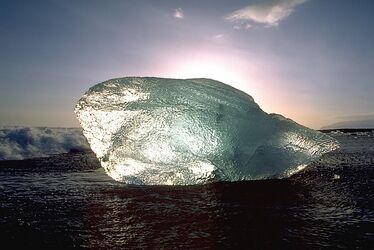
In the far north, as ice forms and cracks it produces musical sounds. In a video on Singing Ice, Jonna Jinton--who moved to rural northern Sweden eight years ago, and now documents her experiences on YouTube-- talks about the sounds made by ice. "It feels a bit spooky to walk down to the ice at night ... being surrounded by these loud, strange sounds. It's like the sound of an ancient spirit awakening under the ice, roaring out in the night."
What might music education be if we included the singing ice in our classrooms? How do our experiences with ice--our global understandings and local experiences--change in the face of melting glaciers, or the pollution caused we cause in our home freezers? In an article in South Atlantic Quarterly, Matthew Burtner suggests music is well-suited for understanding and depicting climate change. Following this model, we could guide students to compose their own musical stories of ice - program music that relates individual experiences with ice, which are dependent upon local weather and climate, as well as global challenges. Informances (informative-music-performances) are great ways to not only help students learn music and social challenges embedded in musics, but also to teach communities through musical action.
There is also written music that might be used to open conversations about ice and ecological issues. I can't help but think of Jinton's Singing Ice when I hear Bruce Sled's wordless SSA composition, Ice. Similarly the piece for young string orchestra, Ice Mountain by Stephen Chin, can open space for conversations about ice. Depending on where you live, perhaps the best thing is to take a field trip to a frozen pond or lake, where students can record their local soundscapes in the winter ice. Returning home, the students can arrange these recordings into a cohesive composition to share in concert. Their compositions may not be as beautiful as Jinton's, or Sled's, or Chin's portrayals, but education is about process over product; and music education is primarily about education.
DJS
 RSS Feed
RSS Feed
